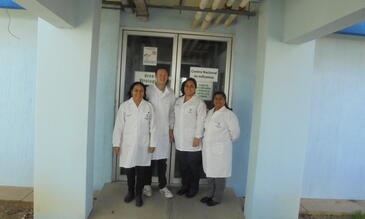
LSTM hosts the diagnostic unit which has been set up to develop diagnostics tests for infectious disease. Our focus is in multiplexed molecular tests which can simultaneously detect more than one pathogen or drug resistance marker. We collaborate extensively with industry to deliver diagnostics that can be utilised outside of a laboratory environment. We have a broad portfolio of diagnostic development and evaluation, and have highlighted 3 programmes of work below.
Current Projects:
- Emerging Infectious Disease
We are currently involved in the development of tests for simultaneously detecting multiple arbovirus infections, such as Dengue fever (serotypes 1-4), Zika, Chikungunya, and Mayaro.
This ability to detect multiple pathogens is extremely important when symptoms for disease are not specific, for example patients presenting with undifferentiated fever. We have worked with Qiagen to produce a prototype qRT-PCR kit for the detection of acute Chikungunya and Dengue infection. We are now working with Biogene to produce tests capable of detecting multiple pathogens in close to patient settings, for example a health clinic or a district hospital. We are currently active in Brazil and Guatemala within a MRC emergency grant for Zika diagnostics. Our work has shown that co-infection with more than one arbovirus is common, for example one third of the patients had Chikungunya and Dengue at the same time (Edwards et al. 2016), underlining the need for multiplex testing.
2. Anti-Microbial Resistance & Tuberculosis
Molecular tools can also be used to detect antimicrobial resistance. There are many genetic targets associated with drug resistance, and here multiplex tests become extremely important. We have recently started the design of assays to diagnose drug resistant genotypes from patients with resistance to carbapenem and cephalosporin antibiotics. We will be testing isolates from the UK and Malawi; regionally different assays will be needed to target local resistance patterns.
We work extensively with industry to design and improve TB diagnostics using our extensive culture collection and Containment Level 3 Facilities at LSTM. We can facilitate limit of detection experiments and can extend to clinical studies with our partners in high-TB endemic regions including Moldova, Nigeria and Ethiopia.
3. Neglected Tropical Disease (NTDs) & Malaria
We are currently implementing molecular diagnostics for Schistosomiasis and Soil Transmitted Helminths with the DFID funded COUNTDOWN programme hosted by LSTM in Ghana and Cameroon. We work with the STOP MIP consortium to develop sensitive and specific molecular tests for Malaria in Asia.
Emily Adams works extensively with the NTD modelling consortia on Visceral Leishmaniasis. We recently published an article in Nature on the design and use of specific Visceral Leishmania diagnostics for the elimination campaign.
Collaborate with us! Please email Dr Emily Adams (Emily.adams@lstmed.ac.uk) to talk about the design, development and evaluation of diagnostics for infectious disease.
